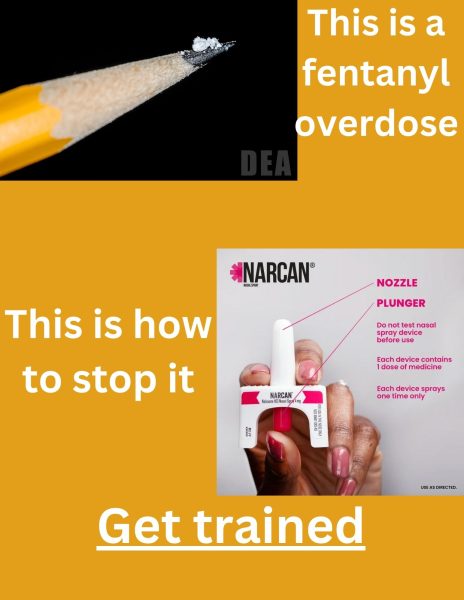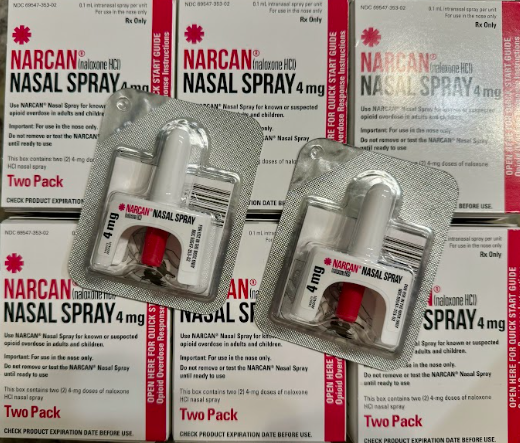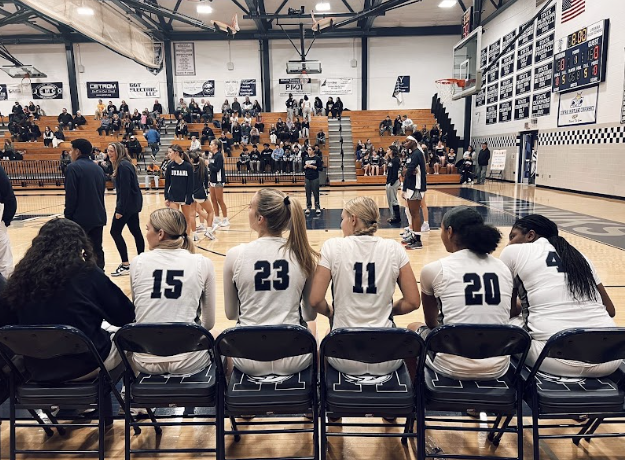Between April 2023-April 2024, over 100,000 people died from an opioid overdose in the United States, 2,348 of those people were Marylanders. An average of 22 teens in the US experience a fatal overdose a week.
Naloxone was FDA approved in 1971 and can be used to treat heroin, fentanyl and other opioid overdoses. The spray version of naloxone is known as Narcan, Narcan is available to the public.
The drug naloxone is an opioid antagonist which means it blocks the effects of opiates on the brain by binding to the receptors.
Naloxone only stays in the body for 30-90 minutes but drugs like fentanyl can stay in the body for weeks. Drugs like sustained-release oxycodone release the doses periodically, this can result in the need for multiple doses of Narcan or multiple potential fatal overdoses.
Narcan can save many people’s lives, but it isn’t as accessible as you may think. Some states require a prescription in order to purchase Narcan, while other states charge 40+ dollars for one dose.
Two years ago, Narcan was implemented in schools and has been used in multiple schools nationwide.
In Urbana, Narcan is located in the nurse’s office, as well as select medical kits around the school. Staff are not required to be trained in Narcan administration but police officers, school nurses and first responders are.
Narcan is helpful in the fight to save lives but the question remains, how can we prevent drug use in children? While this answer is complicated, the first step is learning how addiction can develop.
Urbana High’s School resource officer DFC Kay provides his input, “lowering drug use among the children in the community is everyone’s responsibility.”
This means everyone: school districts, teachers, parents and peers. Thousands of schools across the country have pushed back start times for high schoolers which has increased mental health in schools and by default decreased drug use.
Teenagers with ADHD or impulse control disorders are also susceptible to addiction. Teens who participate in heroin use have significantly higher scores of impulsivity.
A study that was done in the UK found that three-quarters of the patients with schizophrenia were dependent on drugs. Mental health and illness is a huge concern in schools, poor mental health increases drug use immensely.
There is also the contender of education on addiction. How in depth are health classes going? Do health classes give the full truth?
In order to avoid a problem teenagers need the complete and honest truth.
Lieutenant Chad Aloi at the Montgomery County Sherriff’s Office says, “[teens] should also be educated on ALL the resources available to parents and kids.”
A teenagers genetic makeup plays a big role in their susceptibility to addiction too. In heroin addiction, one specific phenotypic variance was connected to a genetic common factor. This means that there was one connection in genetics between majority people who are addicted to heroin which directly connects genetics to addiction.
Addiction or substance abuse disorder is a chronic medical condition defined by the inability to stop the use of drugs or alcohol. People suffering with this condition can experience irritability, drowsiness and extreme weight loss.
1 in 8 children have a parent with substance abuse disorder. Children who have a parent with substance abuse disorder are at a much higher risk to develop this disorder themselves.
They are also at risk for liver disease, heart disease and COPD. Education in drug abuse can lower adolescent addiction by a tremendous amount.
We all know that kids and adults spend hours watching TV and on their phones. This break from reality can be needed at times but is it doing more harm than good?
The media has been glamorizing drugs for years and it is extremely detrimental. TV shows and movies do not show the true painful experience that comes with addiction. They fail to show the consequences of drugs like vomiting, organ failure, rotting teeth, and homelessness. Instead, they show the parties, excitement, and culture around drugs.
People on TikTok have even coined the term “fentfold” which refers to the physical stance of someone who is on fentanyl. The term can be seen on videos showing drug addicts, usually in big cities, hunched over themselves barely moving. The mockery of addicts and illicit drugs made by the media has done nothing but reduce peoples sympathy and concern for this problem.
One way you make sure to help people is to be trained on Narcan and carry it with you. Narcan is not a save-all for drugs but it can certainly lower the deaths from opioids.

There are many contenders to the drug problem that must be addressed, but prevention of this epidemic spreading to children is extremely important.
Aloi says, “It’s hard to regulate the problems that drugs cause especially in schools… everyone comes from different backgrounds and not one approach works for all. So the more resources that families could be provided the better.”
In the United States, there are hundreds of treatments for opioid addiction. A lot of them are covered by medical insurance and are treatment facilities for the patients to live in.
A treatment facility may not be the best solution for you so helplines and support are available 24/7. These helplines are available in Spanish and English and are also helpful for mental illness or suicide.
Even though recovery from addiction is not 100% guaranteed, the sooner you seek help the better.
Urbana High School practices “See something, Say something”, if you see someone participating in illegal or concerning activities say something, you just may save someone’s child.
This article was made in loving memory of Scott Hammond









An Anyonymous FCPS Substitute • Nov 11, 2024 at 10:17 AM
Thank you for this article. I think it needs to be on the forefront of parents minds. I really appreciate this being an article, and just want to say thank you for The Hawk for allowing it, first of all, and second for spreading the word.